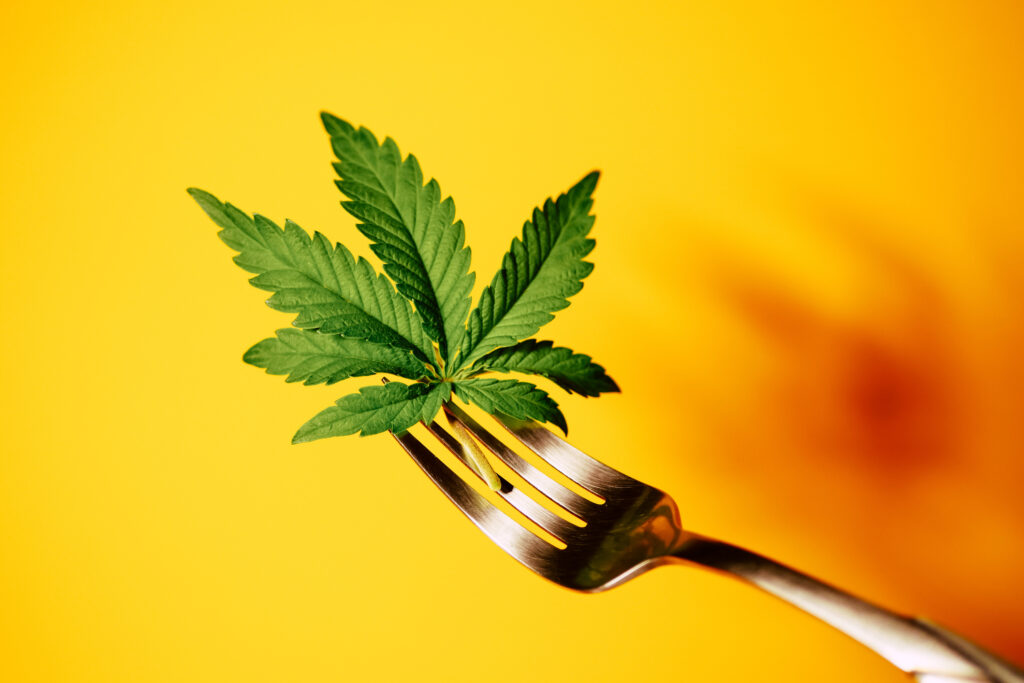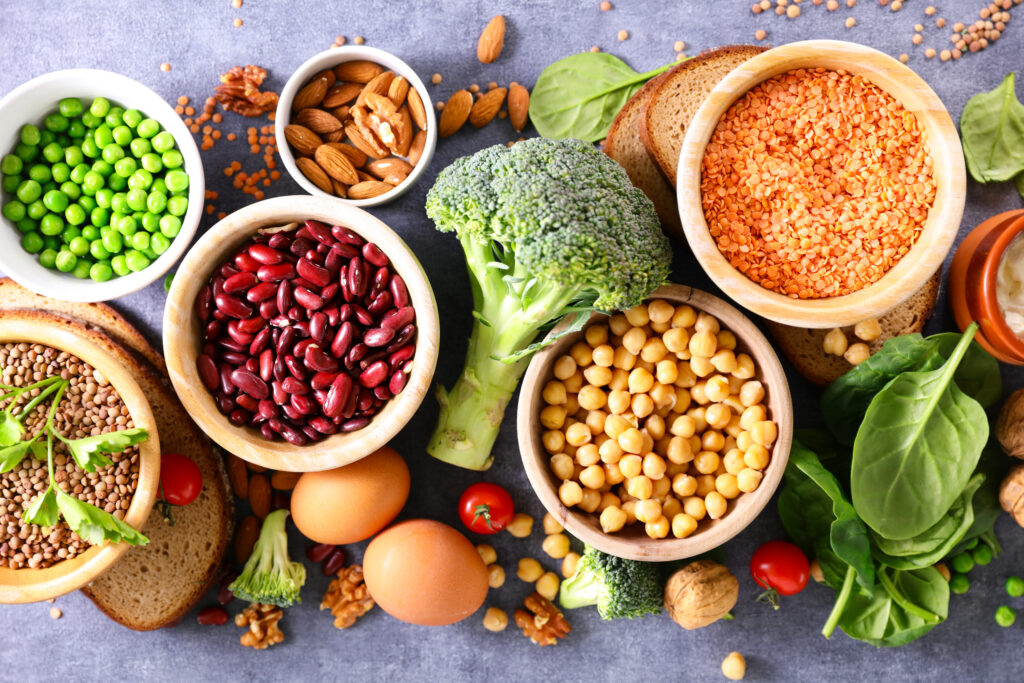Your endocannabinoid system is active regardless of your cannabis use. One of the chief functions of the ECS is to regulate energy metabolism as part of its many homeostatic functions.
Although cannabis is known for giving the “munchies,” cannabis use is associated with lower body mass index (BMI).
So, what’s going on here? Does cannabis speed up your metabolism?

The Endocannabinoid System, Metabolism, and Appetite
First and foremost, metabolism is like your body’s engine. Metabolism includes all chemical reactions that occur within your body, including:
- Catabolism: breaking down substances into simpler forms.
- Anabolism: taking simpler substances and creating more complex cellular components.
- Cellular respiration: using nutrients and oxygen to produce adenosine triphosphate (ATP) molecules.
If metabolism is the engine, ATP is the fuel. ATP is an energy-rich compound found in the tissues of all living things. Your body needs ATP to carry out many different functions; without it, cells can not survive.
The endocannabinoid system regulates metabolism and appetite primarily through the central nervous system — a.k.a. your brain.
There are CB1 receptors in the hypothalamus, which is a part of the brain that regulates hunger, thirst, and hormones. Additionally, the hypothalamus interacts with all other areas of your brain.
In the hypothalamus, activation of CB1 receptors reinforces the motivation to find food and increases your appetite. CB1 receptor activation in the hypothalamus can also affect the production and release of certain hormones, further impacting appetite and metabolism.
In addition to the hypothalamus, the ECS appears to regulate food intake through the vagus nerve. The vagus nerve connects the medulla oblongata to the gastrointestinal tract to monitor digestive processes.
There are also ECS receptors in the small intestine and other organs of the digestive tract that appear to modulate hunger and food intake.
As a review in the Cannabis and Cannabinoid Research journal explains, CB1 activation in the brain also increases appetite by enhancing taste and smell pathways to make food seem more appealing. Both reviews cited explain that CB1 activation increases energy conservation and storage, as well.
But if CB1 activation — whether through endocannabinoids or THC — increases energy storage, appetite, and food intake, why is cannabis use associated with lower BMI?
Does Cannabis Speed Up Your Metabolism?

Across several different studies assessed in the review mentioned above, “Cannabis users consumed an additional 834kcal/day relative to non-users,” the authors say.
“As the BMI of cannabis users is lower than non-users, this suggests that cannabis users must have increased metabolic rates,” the authors continue.
Before assuming that cannabis speeds up metabolism, there are several other factors to account for. Cannabis users generally tend to consume less alcohol, and alcohol is notoriously calorie-dense.
Older individuals who use medical marijuana may be more active due to reductions in pain and other symptoms they may be experiencing, as well.
But outside of lifestyle factors that could skew the results, a few proposed theories may explain the relationship between cannabis use and lower BMI.
It’s well-known that frequent cannabis use causes individuals to develop a tolerance to cannabis. This tolerance means you need to use more cannabis to feel the same effects you experienced at a lower dose.
Frequent cannabis use and overstimulation of ECS receptors cause CB1 receptors to become desensitized. While short-term or infrequent use of cannabis may induce the munchies, long-term use may dull this effect.
In this instance, frequent cannabis use may stop CB1 receptors from increasing energy storage and appetite. Meanwhile, your metabolism remains stimulated.
The review also notes that CB1 receptors remain desensitized for 3-4 weeks after stopping cannabis use. This lasting desensitization could explain why individuals experience a lack of appetite after quitting cold turkey or going on a “t-break” (tolerance break).
Other theories suggest that cannabis, in combination with a healthy dietary ratio of omega-6 to omega-3 fatty acids, enhances the “metabolic benefits” of cannabis use.
Why Do I Get the Munchies From Cannabis?
In summary, there are two key reasons why acute or infrequent cannabis use causes the munchies:
- Cannabis makes food seem more appetizing: CB1 receptor activation enhances the taste and smell pathways in your brain, making food appear more palatable. This increases your motivation to eat food and the reward you feel from it afterward.
- Cannabis tells your brain and your gut that you’re hungry: The CB1 receptors in the hypothalamus, vagus nerve, and gastrointestinal tract all work together to send signals to your brain saying, “Hey! I’m hungry! Put some food in me!”
Even so, there are cases where people may never feel the munchies from cannabis. It may boil down to your individual biology.
In the same vein, people may always feel the munchies after smoking or ingesting cannabis, regardless of how long or regularly they’ve been using cannabis for.
At the end of the day, everybody — or every body — is built differently.
What About Cannabis For Weight Gain?
Although cannabis is associated with lower BMI, there are health conditions in which individuals are advised to use cannabis to help with weight gain.
For example, loss of appetite and nausea are associated with chemotherapy. Individuals undergoing chemotherapy may use medical cannabis to reduce nausea and stimulate their appetite to return to a healthy body weight.
Individuals with AIDS have also tried cannabis to help gain and maintain a healthy weight.
In theory, the initial appetite-stimulating and energy-conserving effects of beginner cannabis use could help someone gain weight. But long-term use could reduce the appetite-stimulating effects, which may help people stay at and maintain a healthy body weight.
The antiemetic (nausea-reducing) properties of cannabis also play a role in maintaining proper food intake in these cases, too.
THCV — Appetite Regulation & Metabolism
One cannabinoid in particular has been getting a lot of attention in the media over this topic — tetrahydrocannabivarin.
THCV is a rarer, non-psychoactive cannabinoid typically found in South African hybrid varieties of cannabis. However, even these varieties never tend to have THCV levels that exceed 1.5%.
Studies have shown that THCV decreases appetite while increasing energy metabolism. Thus, it may show promise in the management of type 2 diabetes and obesity-related disorders.
Additionally, Cannabis Pharmacy author Michael Backes says a U.K. study found 10mg of THCV taken orally increased connectivity in brain networks that are impaired among individuals who are obese.
Other studies cited by Backes say that THCV may decrease the intensity of THC and decrease memory impairments associated with THC.
While THCV has been getting a lot of attention as the “diet cannabinoid” or “diet weed,” it is very rare to find in your run-of-the-mill cannabis.
Perhaps that will change in the future, though.
Key Takeaways: Cannabis Affects Appetite and Energy Regulation

Although cannabis is infamously associated with the “munchies,” a paradox has sparked much scientific interest. While cannabis users tend to consume more calories than “non-users,” those who dabble in cannabis regularly tend to have a lower BMI.
To make the paradox even more complicated, CB1 activation increases appetite, makes food more palatable, and increases energy conservation. So what’s going on here?
Well, it’s theorized that frequent cannabis use dulls the effects of CB1 activation on appetite. Therefore, metabolism remains stimulated, but appetite decreases, and food intake either remains normal or decreases.
Additionally, the rare, non-psychoactive cannabinoid THCV seems to exert direct effects that increase energy metabolism and decrease appetite.
Lastly, while frequent cannabis use is associated with a lower BMI, it’s worth noting that smoking or ingesting cannabis won’t magically make the pounds melt off. In fact, beginner cannabis use is strongly associated with an increase in appetite and energy conservation.
References
- Moini, J. (2019). Anatomy and Physiology for Health Professionals (3rd ed.). Jones & Bartlett Learning.
- Watkins, B. A., & Kim, J. (2015). The endocannabinoid system: directing eating behavior and macronutrient metabolism. Frontiers in Psychology, 5. https://doi.org/10.3389/fpsyg.2014.01506
- Clark, T. M., Jones, J. M., Hall, A. G., Tabner, S. A., & Kmiec, R. L. (2018). Theoretical Explanation for Reduced Body Mass Index and Obesity Rates in Cannabis Users. Cannabis and Cannabinoid Research, 3(1), 259–271. https://doi.org/10.1089/can.2018.0045
- Think About Cannabis. (2022, August 9). Chemotherapy & Cannabis. https://www.thinkaboutcannabis.com/health-wellness/chemotherapy-cannabis
- Backes, M., & Md, W. A. (2017). Cannabis Pharmacy: The Practical Guide to Medical Marijuana — Revised and Updated (New ed.). Black Dog & Leventhal.
- Abioye, A., Ayodele, O., Marinkovic, A., Patidar, R., Akinwekomi, A., & Sanyaolu, A. (2020). Δ9-Tetrahydrocannabivarin (THCV): a commentary on potential therapeutic benefit for the management of obesity and diabetes. Journal of Cannabis Research, 2(1). https://doi.org/10.1186/s42238-020-0016-7